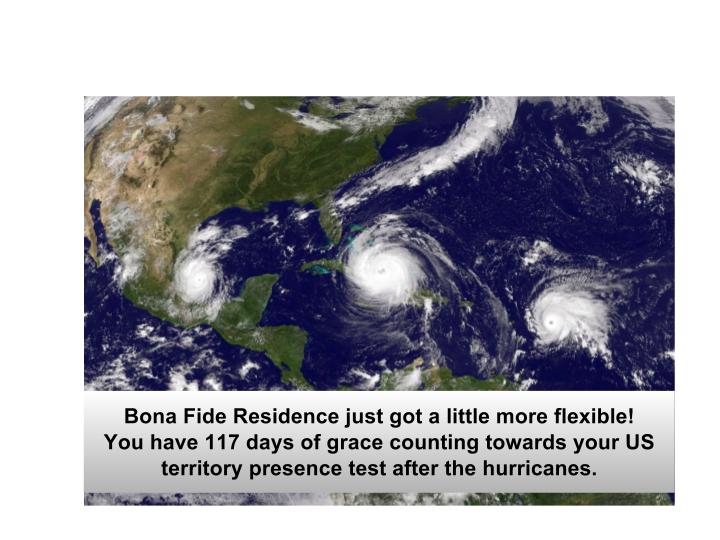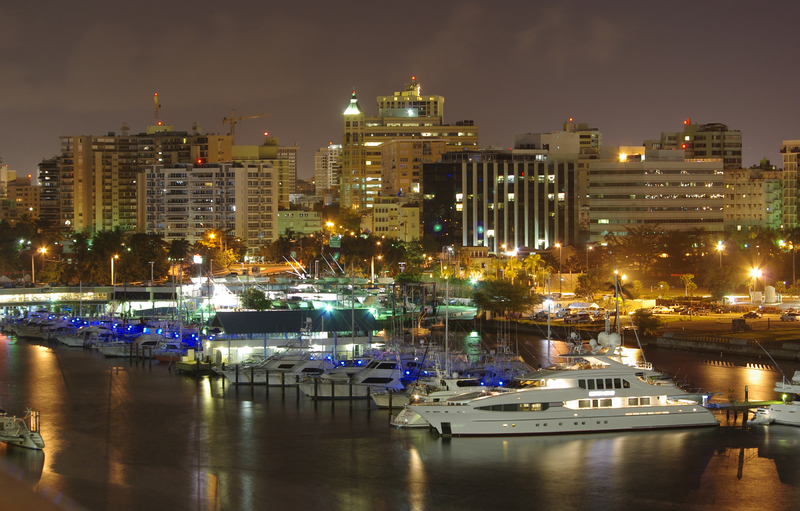Puerto Rico Act 22 and Act 20 Residency in 2017 after Hurricane Maria
Puerto Rico residents are receiving relief in all forms. For example, Banco Popular has put a hold on lease and mortgage payments for 3 months and others are following suite. Moreover, the IRS issued a letter ruling regarding to residency in the territories and meeting physical presence test under section 937(a).
Section 937(a) of the IRC describe how an individual considered a “bona-fide resident” of US territory if he or she meets certain tests. The most common test is if you spend at least 183 days on the island.
Most Puerto Ricans pay income tax to the local government. So, this rule means that they don’t need to pay the US government, just Puerto Rico. The tax rate in PR is about the same as the Federal rate.
Then, in 2012, Puerto Rico passed Acts 20 and 22. Under Act 20, if you operate a qualifying business from Puerto Rico, you pay only 4% corporate income tax. Under Act 22, if you move to the island, become a resident, and buy a home there, you pay zero in capital gains tax. Act 22 is only available to new residents.
These tax laws are possible in Puerto Rico because of its unique status as a Territory. If Puerto Rico were to become a State, these tax benefits would disappear.
So, for Act 20 and 22, becoming a resident of Puerto Rico means you pay no US Federal taxes on territory sourced income. To meet these test and qualify for tax free status, you must not have a tax home or closer connections in the US. Also, as stated above, you should spend 183 days a year in Puerto Rico.
Before the hurricane, you could count up to 14 days of international travel towards your 183 day requirement in Puerto Rico. If you traveled 40 days abroad, you could count only 14 for Puerto Rico and the rest would be days in the United States (a bad thing).
Due to the catastrophic damage caused by Hurricane Maria, and previously by Irma, the usual 14 day absence period will be extended to 117 days up until December 31, 2017. This gives the resident an exception to the 183 required days.
NOTE that this exception currently only covers tax year 2017! It is not extended into tax year 2018 unless a new letter ruling is issued.
In this Notice the IRS has addressed several issues related to compliance with the presence test for a bona fide resident in a possession (26 CFR 1.937-1). This section lists all the requirements that a resident needs to comply with to satisfy the presence test for a taxable year:
- “Was present in the relevant possession for at least 183 days during the taxable year.” Notice 2017-56 has just established an exception due to the hurricane, extending the 14 day absence period to 117 days.
- “Was present in the relevant possession for at least 549 days during the three-year period consisting of the taxable year and two immediately preceding taxable years, provided that the individual was also present in the relevant possession for at least 60 days during each taxable year of the period.” Even though the 14 day absence period has been extended to 117 days, I strongly recommend the 549 days are fully completed.
- “Was present in the United States for no more than 90 days during the taxable year.” Even though the extension of the absence period should permit the additional days spent in the US, the Notice doesn’t address this particular requisite.
- “During the taxable year had earned income in the United States, if any, not exceeding in the aggregate the amount specified in section 861(a)(3)(B) and was present for more days in the relevant possession than in the United States;”. Again, the IRS notice makes no reference to this requisite.
- “Had no significant connection to the United States during the taxable year.”
You can take advantage of the extension of the absence period if you have yet to complete the 183 days in Puerto Rico. But be very careful with the compliance of the other presence requirements, specially the earned income and the significant connection to the US. As an example, this last one should take into consideration that you have no principal place of residence in the US, or at least have no homestead exemption.
For more information on the tax holidays available in Puerto Rico, see: A Detailed Analysis of Puerto Rico’s Tax Incentive Programs
For the latest version of Puerto Rico’s Act 20, see: Puerto Rico Eliminates 5 Employee Requirement
And for information on post hurricane plans, see: What’s Next for Puerto Rico After Hurricane Maria?
I hope you’ve found this article to be helpful. For more information on setting up your business in Puerto Rico, please contact us at info@premieroffshore.com or call (619) 483-1708.


